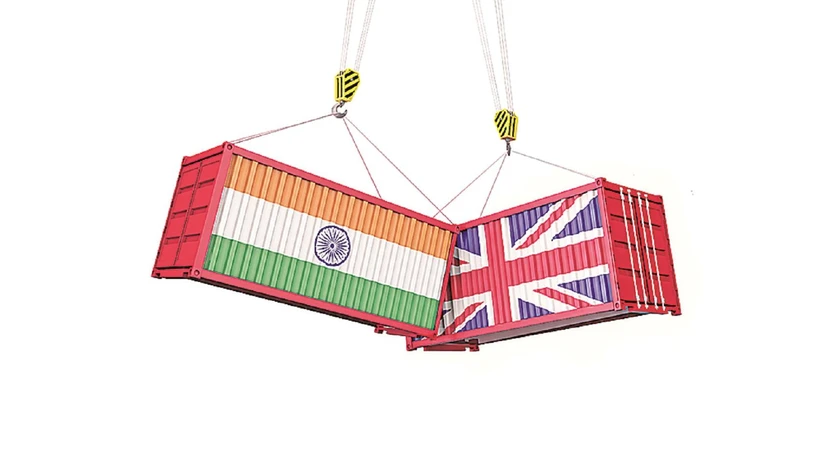A New Benchmark in International Diplomacy:
At a time when the entire world is reeling from rising geopolitical conflicts, widespread uncertainty, and rapidly increasing protectionism, India struck the most comprehensive bilateral trade deal ever with the United Kingdom on July 24, 2025.
The deal spans far beyond traditional merchandise exports and imports to cover services, digital trade, movement of persons, labour issues, the environment, government procurement, and government-to-government dispute settlement, and is technically termed the Comprehensive Economic Trade Agreement (CETA). India’s historic relationship with the UK since colonial times, alongside long-standing cultural and social exchanges backed by a shared democratic system based on the Westminster form of democracy, makes the two nations natural allies with multiple mutual complementarities.
Deliberations for the deal commenced during the tenure of Boris Johnson as the Prime Minister of the UK in January 2022 but were delayed due to the complexity of negotiations, primarily due to a broad spectrum of contentious issues, ranging from the movement of people and visa regulations, services trade, and patent laws, to climate change, data localisation, and non-tariff trade barriers, in addition to political instability in the UK, which witnessed four distinct British Prime Ministers during the negotiating period.
Bilateral negotiations involved a battalion of high-profile negotiators with cutting-edge multidisciplinary expertise from both sides, who navigated the turbulent waters of sensitive, often conflicting, national interests in a landscape characterised by frequent economic and geopolitical shifts spanning three and a half years and fifteen rounds of deliberations. Finally, the landmark trade deal was concluded and jointly declared on May 6, 2025, by Indian Prime Minister Narendra Modi and British Prime Minister Keir Starmer.
Indian negotiators are to be complemented for safeguarding India’s strategic interests under trying circumstances and arriving at a mutual consensus of trade-offs during the challenging rounds of negotiations.
Major Gains for India’s Exports
Average import tariffs on British goods in India, which are likely to decline from 15% to 3%, will benefit Indian consumers, especially in sectors such as medical devices, cars, cosmetics, and alcoholic beverages. The India-UK CETA opens up massive opportunities in the UK economy worth over $3.8 trillion, hitherto grossly unexplored. Under the agreement, nearly 99% of Indian merchandise covered under tariff lines will now enjoy duty-free access to the UK market, including major labour-intensive exports such as textiles, footwear, toys, engineering goods, and gems and jewellery.
Textiles and apparel have been a sector of high concern as it offers the second-largest employment after agriculture, offering jobs to over 48 million people, accounting for a 7.6% share of India’s exports yet accounting for merely 3.9% of the world market. India’s share in the UK’s large textile and apparel market of $28.7 billion is merely 6.6%, compared to Bangladesh’s 22%, which employs a much lower workforce of 5 million, leveraging mostly technology, supply chain, and operational efficiencies.
To make Indian products competitive, duty reduction in major markets has long been the demand of the Indian textile and apparel industry. As Bangladesh, along with many LDCs, enjoys duty-free entry under GSP schemes to the UK, the CETA with duty-free access to Indian exports compared to the 8-12% previously would provide a much-needed critical edge to Indian garments and textiles in the British market and help boost exports.
Additionally, the deal opens up immense opportunities to expand in the UK’s vast, unexplored market of $37.5 billion for agricultural products and $51 billion for processed foods and beverages, with India’s share being less than 2%. Given the duty-free access of 99% of processed foods and 95% of agricultural products to UK markets, from a previous import tariff of 8-70%, this could prove to be a critical factor in boosting India’s agricultural exports, a sector irrefutably indispensable to the rural economy and employment. Notably, processed foods, Indian spices, tea, coffee, cereals, pulses, and vegetables are likely to be the major gainers from tariff elimination.
Coming to the processed food market in the UK, which attracts a high import duty of up to 70%, the deal has now provided access to 99.7% of products under the tariff line. This could essentially prove to be a game changer that would not only enhance India’s processed food exports but also lead to improved innovation and quality across the industry, contributing to its global competitiveness. Tariff elimination also offers immense opportunities for Indian spices, which already dominate the UK market of $412 million with a 23% share after the Netherlands, but are subjected to 8-20% import duties.
An FTA Beyond Merchandise Trade
In addition to trade in goods, the trade agreement also paves the way for significant expansion of exports of services, wherein professionals such as yoga instructors, chefs, musicians, etc., get improved access by granting 1,800 visas. Moreover, under the Double Contribution Convention (DCC), short-term workers posted for up to 3 years won’t be required to pay social security contributions in both countries, which would considerably enhance their competitiveness and savings. Additionally, it would improve the cost-efficiency of Indian companies operating in the UK.
For the first time, the agreement includes binding commitments to grant non-discriminatory access to Indian companies in the UK’s $122 billion public procurement market, covering goods, services, and construction.
CETA also embeds within itself a strong government-to-government dispute settlement mechanism, enabling a swift resolution of trade-related disputes. In fact, several critical non-trade issues such as environmental standards, labour rights, anti-corruption, gender equity, etc., are integrated within the FTA. In addition to this, a bilateral investment treaty is being negotiated separately between the two countries.
Explicitly, the India-UK trade deal seems to be a highly balanced and comprehensive trade agreement that would be a clear win-win for both countries, likely to create millions of jobs and enormous opportunities for bilateral trade and investment. However, its effective implementation is the key, which calls for meticulously chalked-out implementation strategies based on thorough research and grassroots stakeholder consultations, commitment, and the ability of central and state governments, along with hundreds of their departments across the country, to refrain from working in silos and come together to harness the full potential of CETA, leading to a multiplicity of direct and its immense spin-off gains.






